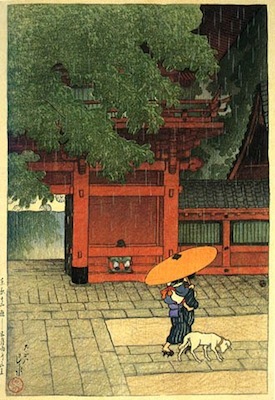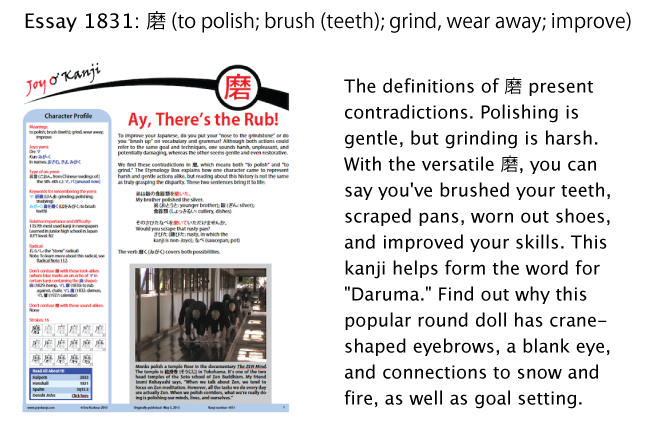Rain or Shine
People constantly have weather on their minds. When I scroll down my Facebook news feed, I see that topic more than perhaps any other.
As far as I can tell, that's what my dogs spend much of their day thinking about, too: "It's cold. Where's the sun? Ah, there it is! Hurray! Life is good! Oh, no. The sun moved. I'll go plop down in a new patch of sunlight. Now I'm hot, but I don't feel like moving, so I'll just sit here panting."
We may have smart phones and opposable thumbs, but we're not so different from the animals!
As long as that's the case, we might as well put our full attention on the weather. How does it seem from a Japanese perspective?

"May Rain at Sanno Temple," 1919, by 川瀬 巴水
(かわせ はすい,1883–1957).
Rain
It's no wonder the artist 川瀬 巴水 chose to portray rain in this woodblock print. Just look at all the water in his name: a river (川), the "water" radical (氵), and then the water kanji 水. Soggy, soggy man.
When I posted this woodblock print on Facebook yesterday, a Japanese friend left a concise comment:
五月雨 (samidare)
The kanji are so simple, breaking down as May (1st 2 kanji) + rain, but what's with the yomi, which appears to be ateji? I consulted a dictionary and found this:
五月雨 (さみだれ: early-summer rain)
Summer in May? I asked my proofreader for input. Working from sources such as Wikipedia, he said that the definition alludes to the lunar calendar. Oh, yes, I always forget about that. In that old calendar, 五月 corresponds to late June in the solar calendar (the one most of us use now). Late June in Japan is the start of the rainy season, so "early-summer rain" makes perfect sense.
He also noted that people usually use 五月雨 in haiku as a 季語 (きご), a word that creates a specific image of a particular season.
As for the yomi さみだれ, he says that it evolved from original archaic Japanese. One can read 五月 as さつき, so that explains the さ in さみだれ. Another source indicates that an alternate name for 五月 is 早苗月 (さなえづき), which would also supply the さ. As 早苗 means "rice seedlings," 早苗月 would mean "rice seedlings month." However, some dictionaries say that the さ- in 早苗 is a prefix meaning "god's rice." That gives us "god's rice seedlings month"! Goodness, does anyone really know what's going on here?!
The みだれ part is easier. It comes from 水垂れ (rainfall), which literally means "water falling."
As long as we're talking about rain and etymology, what foreign word do you think the katakana represents in the following term?
ゲリラ豪雨 (ゲリラごうう: unexpectedly strong rain (for the region, etc.); sudden rain) powerful + rain
I'll block the answer with another woodblock print from our soggy artist, as I have an unexpectedly strong passion for his work:

Image Courtesy of Carll H. de Silver Fund
The title of this piece (circa 1919) is as follows:
東京十二題 こま形河岸
Twelve Woodblock Prints Taking Tokyo as the Theme: Komagata-Gashi
You know 東京 (とうきょう: Tokyo). Then there's 十二題 (じゅうにだい), where 十二 means "12" and 題 means "theme." There's no Japanese word corresponding to "woodblock prints" here; that's implied. So with 東京十二題 we have "Twelve Woodblock Prints Taking Tokyo as the Theme."
As for こま形河岸 (こまがたがし), which one could write entirely in kanji as 駒形河岸, that's part of Asakusa in Tokyo. By the way, the kanji break down as horse + shape + river + beach. A river beach in the shape of a horse! Is it just a coincidence that the artist included a horse in this image?!
The answer is that ゲリラ corresponds to "guerrilla"! Talk about unexpected things! Just as guerrilla warfare involves surprise raids, a sudden storm can make it seem as if Mother Nature is bombarding the ground with rain.
Sun
By now you're probably feeling waterlogged, so let's bring on the sun. Yesterday I also spotted this Facebook post from a Japanese friend in a hot part of the world:
スタバの抹茶フラペチーノ日和です。
It's a good day for a Starbucks matcha frappuccino.
抹茶 (まっちゃ: matcha; powdered green tea)
The red word was new to me. Here's a definition of 日和:
日和 (ひより: (1) weather; climatic conditions; (2) fine weather; clear day; (3) situation; state of affairs; (4) sea conditions; good day for sailing)
However, in the frappuccino sentence, -日和 is a noun suffix read as -びより and means just one thing: "an ideal day to do something."
Both 日 and 和 can represent "Japan"! Do they lend any of that meaning to this word?
I turned again to my proofreader, asking for the etymology of 日和. He referred to a blog post that says the following: Originally, ひより meant 日寄り (literally, “close to the sun”), meaning “good weather.” Then the famous eighth-century poem anthology 万葉集 (まんようしゅう) included the term にわ (庭, which meant “vast sea” back then), rendering it as 日和. (In that context, 日 carried the sound of に, and 和 was read as わ.) At that time, the Japanese used kanji phonetically without concerning themselves with the meanings of the characters. However, some readers apparently forgot the rules when it came to 日和; they read it as if each kanji had meaning, misinterpreting this term as “when the sun (日) is peaceful/calm (和)." Because they associated 日和 with ひより (good weather), which was already a separate term, 日和 acquired the reading of ひより.
Now I can see that the "Japan" meanings of 日 and 和 hold no water here, so to speak. In fact, there's no inherent connection between the Land of the Rising Sun and the actual sun, as it rains an awful lot in Japan!
Despite the weather, people continue with whatever they need to do there, rain or shine. Actually, as the Japanese put it, they carry on "rain or wind":
雨の日も風の日も (あめのひもかぜのひも: even on a rainy or windy day; come what may)
This 日 doesn't mean "sun" (or "Japan") but rather "day." (What a language!) So the expression means "(We'll do it) even on a rainy day (雨の日) or a windy day (風の日)." In a broader sense unrelated to the weather, this expression means "come what may."
Speaking of the omnipresence of 日 and the way it keeps changing its meaning, check out this sentence from my language partner:
明日日曜日のいつもの時間でよければ大丈夫なので、いかがですか???
How would it be to talk tomorrow, Sunday, at the usual time?
明日 (あした: tomorrow); 日曜日 (にちようび: Sunday);
時間 (じかん: time); 大丈夫 (だいじょうぶ: okay)
The first red part contains five consecutive instances of 日 as a component! Two more appear in the second red part!
One more thing about the sun. I recently came across an article about the so-called 太陽の塔 (たいようのとう: Tower of the Sun). Having published essay 1651 on 塔 (tower; pagoda; monument) a few weeks ago, I wanted to find out what this Osaka tower looks like. Boy, was I surprised!
Created by artist 岡本太郎 (おかもと たろう) to commemorate and represent the Japan World Expo ’70, which was held in Osaka, this is apparently one of the most famous towers in Japan, especially for those who are middle-aged or older. Although the tower interior hasn't been open to the public in decades, the article says it will be as of next year, due to popular demand.
Essay on 磨
In a departure from news about the weather, I would like to announce that essay 1831 on 磨 is now out. Here's a preview:

Have a great weekend!

Comments